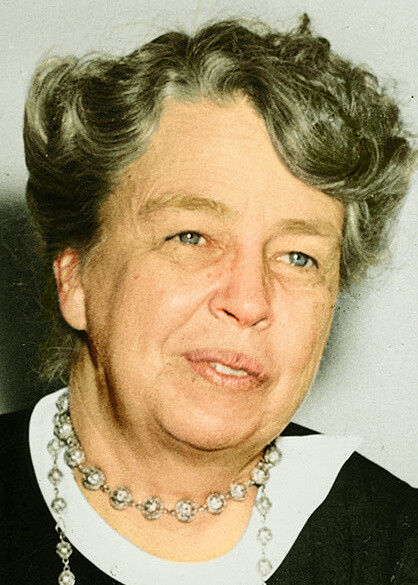MY DAY
By Eleanor Roosevelt
January 1, 1944
Washington – (New Year’s Eve, 1943)
It has been a sad year and yet a year of achievement. May 1944 bring to fruition the plans made for victory in 1943 and may the wishes in the hearts of the servicemen, their mothers, wives and sweethearts, that their dear ones can be at home before the next New Year’s Eve rolls round, come true. That will, I think, will be the wish toasted in the heart of each one of us as we hear the clock strike twelve this year.
It will be impossible this New Year’s Eve not to take stock of our own individual efforts. With so much to be done, how much has each one of us accomplished? None can be satisfied unless they are giving their best. They alone know whether they have actually done so.
A family in Wichita, Kansas, sent me a delightful booklet for Christmas, in which they have gathered together letters from the young soldiers whom they befriended and who have gone to far-off places.
I want to quote their own boy’s letter written from overseas:
Dear Family: It is nice to hear from you after such a long period of time, but it is unpleasant to learn of your changed conditions of living, which I can readily understand from the change in my own condition.
It is too bad you are limited in the use of your automobile. I know how it is to walk through miles and miles of swamp and jungle – so I understand. It is too bad to have your choice of food limited. I have experienced this too, except there is no choice here – so I understand.
It is too bad that Willie has to work so many hours a day at our defense plant. I have to work nights as well as days at our defense plant – so I understand.
It is too bad that Willie has so little time for amusement. I am deprived of amusement too – so I understand.
It is too bad that you have to wait in the rain for transportation. I have to wait in the rain on post and my army transportation and my destinations are uncertain, too – so I understand.
So, it is too bad that you are being paid so little for working so hard. I get only a fraction of your pay – so I understand.
Winning this war is hard on all of us. You work long hours and so do I – so I understand. But, darling, those long hours, I get shot at – do you understand?
I would like to pass on their Christmas wish with one little change to all of you as a New Year’s wish – may we have this year “hearts kinder, life sweeter, hopes brighter, spirit lighter, skies bluer and may this New Year’s greeting do much to cheer you during this year.”
